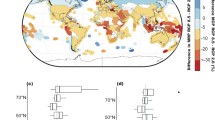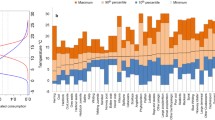Abstract
Global warming of the oceans is expected to alter the environmental conditions that determine the growth of a fishery resource. Most climate change studies are based on models and scenarios that focus on economic growth, or they concentrate on simulating the potential losses or cost to fisheries due to climate change. However, analysis that addresses model optimisation problems to better understand the complex dynamics of climate change and marine ecosystems is still lacking. In this paper, a simple algorithm to compute transitional dynamics in order to quantify the effect of climate change on the European sardine fishery is presented. The model results indicate that global warming will not necessarily lead to a monotonic decrease in the expected biomass levels. Our results show that if the resource is exploited optimally, then in the short run, increases in the surface temperature of the fishery ground are compatible with higher expected biomass and economic profit.





Similar content being viewed by others
References
Arnason R (2007) Climate change and fisheries: assessing the economic impact in Iceland and Greenland. Natur Resour Model 20(2):163–197. doi:10.1111/j.1939-7445.2007.tb00205.x
Bosello F, Roson R, Tol R (2007) Economy-wide estimates of the implications of climate change: Sea level rise. Environ Resour Econ 37(3):549–571. doi:10.1007/s10640-006-9048-5
Branch TA, Watson R, Fulton EA et al (2010) The trophic fingerprint of marine fisheries. Nature 468:431–435. doi:10.1038/nature09528
Caldeira K, Wickett ME (2003) Anthropogenic carbon and ocean PH: the coming centuries may see more ocean acidification than the past 300 million years. Nature 425:365. doi:10.1038/425365a
Cheung WL, Kearney K, Lam V, Sarmiento J, Watson R, Pauly D (2009) Projecting global marine biodiversity impacts under climate change scenarios. Fish Fish 10:235–251. doi:10.1111/j.1467-2979.2008.00315.x
Cinner J, Folke C, Daw T, Hicks CC (2011) Responding to change: using scenarios to understand how socioeconomic factors may influence amplifying or dampening exploitation feedbacks among Tanzanian fisheries. Glob Environ Change 21:17–21. doi:10.1016/j.gloenvcha.2010.09.001
Clark CW (1976) Mathematical bioeconomics. Wiley, New York
Crèpin A-S, Walker B, Polasky S, Steffen W, Galaz V, Folke C, Rockström J (2011) Global dynamics, multiple shocks and resilience. Planetary stewardship and catastrophic shifts in the Earth system. Beijer Discussion Paper N° 288, The Beijer International Institute of Ecological Economics, The Royal Swedish Academy of Sciences, Sweden. http://www.beijer.kva.se/pubinfo.php?pub_id=602. Accessed 26 June 2011
Cushing DH (1975) Marine ecology and fisheries. Cambridge University Press, United Kingdom
Da Rocha JM, Gutiérrez MJ (2011) Lessons from the long-term management plan for northern hake stock: could the economic assessment have accepted it? ICES J Mar Sci 68(9):1937–1941. doi:10.1093/icesjms/fsr105
Da Rocha JM, Gutiérrez MJ (2012) Endogenous fisheries management in a stochastic model: why do fishery agencies use TACs along with fishing periods? Environ Resour Econ 53:25–59. doi:10.1007/s10640-012-9546-6
Da Rocha JM, Gutiérrez MJ (2013) Selectivity, pulse fishing and endogenous lifespan in Beverton-Holt models. Environ Resour Econ 54:139–154. doi:10.1007/s10640-012-9585-z
Da Rocha JM, Cerviño S, Gutiérrez MJ (2010) An endogenous bio economic optimization algorithm to evaluate recovery plans: an application to southern stock of hake. ICES J Mar Sci 67(9):1957–1962. doi:10.1093/icesjms/fsq116
Da Rocha JM, Garza-Gil MD, Varela-Lafuente MM (2011) A model of fishing periods applied to the European sardine fishery. Fish Res 109(1):16–24. doi:10.1016/j.fishres.2011.01.008
Da Rocha JM, Gutiérrez MJ, Cerviño S (2012a) Reference points based on dynamic optimisation: a versatile algorithm for mixed fishery management with bio-economic age-structured models. ICES J Mar Sci 69(4):660–669. doi:10.1093/icesjms/fss012
Da Rocha JM, Gutiérrez MJ, Antelo LT (2012b) Pulse versus optimal stationary fishing: the Northern stock of hake. Fish Res 121–122:51–62. doi:10.1016/j.fishres.2012.01.009
Drinkwater KF, Baugrand G, Kaeriyama M et al (2010) On the process linking climate to ecosystem changes. J Mar Syst 79(3–4):374–388. doi:10.1016/j.jmarsys.2008.12.014
Eboli F, Parrado R, Roson R (2010) Climate-change feedback on economic growth: explorations with a dynamic general equilibrium model. Environ Dev Econ 15(5):515–533. doi:10.1017/S1355770X10000252
Eide A (2007) Economic impacts of global warming: the case of the Barents Sea fisheries. Nat Resour Model 20:199–221. doi:10.1111/j.1939-7445.2007.tb00206.x
Food and Agricultural Organization of the United Nations (FAO) (2012) State of World Fisheries and Aquaculture 2012. SOFIA, FAO Fisheries and Aquaculture Department. http://www.fao.org/docrep/016/i2727e/i2727e00.htm. Accessed 27 April 2012
Garcia CE, Prett DM, Morari M (1989) Model predictive control: theory and practice. A survey. Automatica 25(3):335–348. doi:10.1016/0005-1098(89)90002-2
Garza-Gil MD, Torralba-Cano J, Varela-Lafuente MM (2011) Evaluating the economic effects of climate change on the European sardine fishery. Reg Environ Change 11(1):87–95. doi:10.1007/s10113-010-0121-9
Gelcich S, Hughes TP, Olsson P et al (2010) Navigating transformation in governance of Chilean marine coastal resources. Proc Natl Acad Sci 107(39):16794–16799. doi:10.1073/pnas.1012021107
Hanneson R, Barange M, Herrick SF Jr (2006) Climate change and the economics of the world’s fisheries: examples of small pelagic stocks. Edward Elgar Publishing, Cheltenham
Hannesson R (2007) Geographical distribution of fish catches and temperature variations in the Northeast Atlantic since 1945. Mar Pol 31:32–39. doi:10.1016/j.marpol.2006.05.004
Intergovernmental Panel on Climate Change (IPCC) (2007) Climate change 2007: impacts, adaptation and vulnerability. Contribution of working group II to the fourth assessment report of the intergovernmental panel on climate change. Cambridge University Press, Cambridge, p 976
International Council for the Exploration of the Sea (ICES) (2010) Report of the Working Group on Anchovy and Sardine (WGANSA). 24–28 June 2010, Vigo, Spain. ICES CM 2010/ACOM:16, pp 290
International Council for the Exploration of the Sea (ICES) (2011a) Advice Book 7. 7.4.7. Advice July 2011. ECOREGION. Bay of Biscay and Atlantic Iberian waters. STOCK. Sardine in Divisions VIIIc and IXa
International Council for the Exploration of the Sea (ICES) (2011b) ICES Report on Ocean Climate 2010. Prepared by the Working Group on Oceanic Hydrography
Johannessen OM, Miles M (2011) Critical vulnerabilities of marine and sea ice–based ecosystems in the high Arctic. Reg Environ Change 11(1):239–248. doi:10.1007/s10113-010-0186-5
Kavuncu YO (2007) Intergenerational cost–benefit analysis of climate change: an endogenous abatement approach. Environ Dev Econ 12:183–211. doi:10.1017/S1355770X06003469
Lehodey P, Alheit J, Barange M et al (2006) Climate variability, fish, and fisheries. J Climate 19:5009–5030
Mayne DQ, Rawlings JB, Rao C, Scokaert JO (2000) Constrained model predictive control: optimality and stability. Automatica 36(6):789–814. doi:10.1016/S0005-1098(99)00214-9
Medel C (2011) The effects of global warming on fisheries. Central Bank of Chile, MPRA Paper N° 28373. http://mpra.ub.uni-muenchen.de/28373/. Accessed 25 January 2012
Millennium Ecosystem Assessment (MEA) (2005) Ecosystems and human well-being: current state and trends: findings of the condition and trends working group. Island Press, Washington
MRAG (2010) Towards sustainable fisheries management: international examples of innovation. MRAG Ltd., London
Pascoe S, Vieira S, Dichmont CM, Punt AE (2011) Optimal vessel size and output in the Australian northern prawn fishery: a restricted profit function approach. Aust J Agric Resour Econ 55(1):107–125. doi:10.1111/j.1467-8489.2010.00526.x
Poff NL, Brinson MM, Day JW Jr (2002) Aquatic ecosystems and global climate change: potential impacts on inland freshwater and coastal wetland ecosystems in the United States. Pew Center on Global Climate Change, Arlington
Rockström J, Steffen W, Noone K et al (2009) A safe operating space for humanity. Nature 461:472–475. doi:10.1038/461472a
Schmittner A (2005) Decline of the marine ecosystem caused by a reduction in the Atlantic overturning circulation. Nature 434:628–633. doi:10.1038/nature03476
Sumaila UR, Cheung WL, Lam V, Pauly D, Herrick S (2011) Climate change impacts on the biophysics and economics of world fisheries. Nat Clim Chang 1:449–456. doi:10.1038/nclimate1301
Tahvonen O (2009) Economics of harvesting age-structured fish populations. J Environ Econ Manag 58:281–299. doi:10.1016/j.jeem.2009.02.001
Trathan P, Forcada J, Murphy E (2007) Environmental forcing and Southern ocean marine predator populations: effects of climate change and variability. Philos Trans R Soc Lond B Biol Sci 362:2351–2365. doi:10.1098/rstb.2006.1953
Tseng W, Chen C (2008) Valuing the potential economic impact of climate change on the Taiwan trout. Ecol Econ 65:282–291. doi:10.1016/j.ecolecon.2007.06.015
van der Brugge R, Rotmans J, Loorbach D (2005) The transition in Dutch water management. Reg Environ Change 5(4):164–176. doi:10.1007/s10113-004-0086-7
Vinagre C, Duarte Santos F, Cabral H, Costa MJ (2011) Impact of climate warming upon the fish assemblages of the Portuguese coast under different scenarios. Reg Environ Change 11(4):779–789. doi:10.1007/s10113-011-0215-z
Voss R, Hinrichsen HH, Quaas MF, Schmidt JO, Tahvonen O (2011) Temperature change and Baltic sprat: from observations to ecological–economic modelling. ICES J Mar Sci. doi:10.1093/icesjms/fsr063
Wang M, Overland JE, Bond NA (2010) Climate projections for selected large marine ecosystems. J Mar Syst 79(40271):258–266. doi:10.1016/j.jmarsys.2008.11.028
Worm B, Barbier EB, Beaumont N et al (2006) Impacts of biodiversity loss on ocean ecosystem services. Science 314:787–790. doi:10.1126/science.1132294
Acknowledgments
We thank M. Dolores Garza-Gil, Julia Torralba, and Manuel M. Varela-Lafuente for their valuable comments and suggestions. Financial aid from the European Commission (MYFISH, FP7-KBBE-2011-5, nº 289257), and the Spanish Ministry of Economy and Competitiveness (ECO2009-14697-C02-02, ECO2012-39098-C06-00, ECO2012-39098-C06-01 and ECO2012-35820) are gratefully acknowledged. The first draft of the paper was written while Jose María Da Rocha was visiting Institut d'Anàlisi Econòmica-CSIC, and the hospitality extended by its members is gratefully acknowledged. Sebastián Villasante acknowledges the financial support of the Latin American and Caribbean Environmental Economic Program (LACEEP) and the Norwegian Research Council. The author is also grateful to the Beijer International Institute of Ecological Economics (The Royal Swedish Academy of Sciences, Sweden) for awarding him the Karl-Göran Mäler Scholarship.
Author information
Authors and Affiliations
Corresponding author
Rights and permissions
About this article
Cite this article
Da Rocha, JM., Gutiérrez, MJ. & Villasante, S. Economic effects of global warming under stock growth uncertainty: the European sardine fishery. Reg Environ Change 14, 195–205 (2014). https://doi.org/10.1007/s10113-013-0466-y
Received:
Accepted:
Published:
Issue Date:
DOI: https://doi.org/10.1007/s10113-013-0466-y




